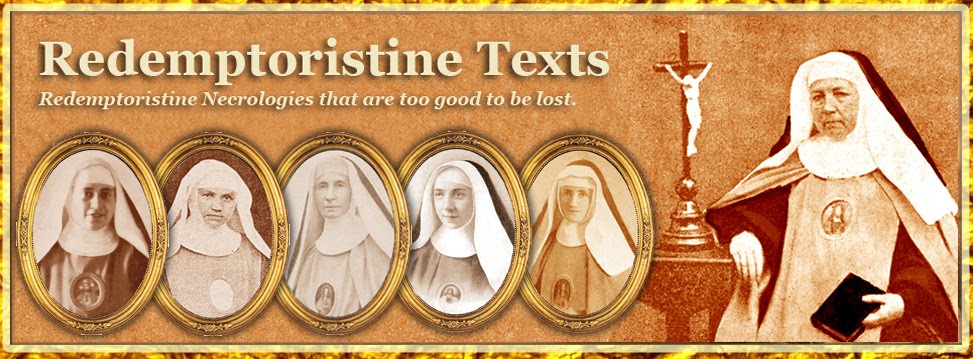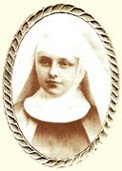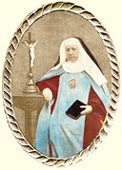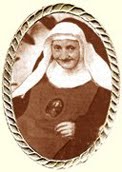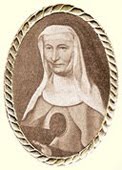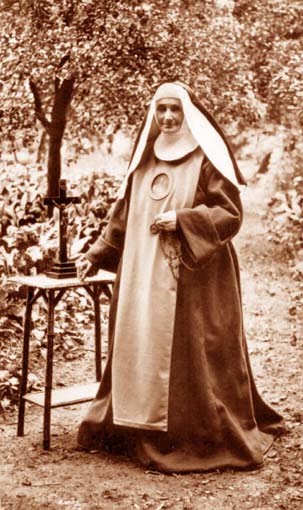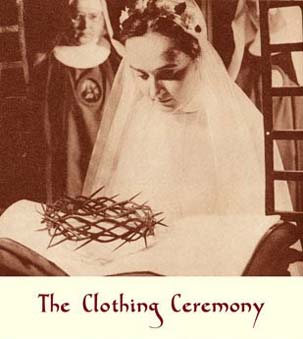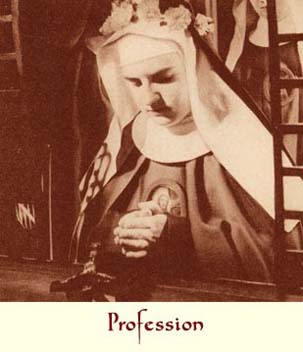Mother Marie-Françoise, in the world Jeanne-Marie Cools, was born on 4th March 1837 at Eindhoven, a town in Brabant in Holland. Her father was a Clerk of the Court in that town. As the only daughter, she was the object of the greatest tenderness on the part of her parents, but after their deaths, and as especially when she was sought after by the world, she said a generous farewell to everything tempting that was offered to her, in order to enter the Convent of Marienthal. She was then twenty three years old.
She spent the first thirteen years of her religious life in this monastery. On 16th August 1874 she was sent to the Convent of Vienna with two other Sisters, but three years later she returned to Holland to replace the Reverend Mother Marie-Cherubine at Sambeek, who had been nominated as the Superior at Vienna. Mother Marie-Françoise filled the position of Mistress of Novices several times, she was elected Vicar three times, and Superior twice, and in the exercise of her different functions she showed as much ability as virtue.
She greatly loved prayer and in it she truly found the nourishment for her soul. She was always distinguished by her love for regularity, by a religious zeal for the Divine Office, and by a great affection for everything relating to the service of God. She always had a marked predilection for her Order, and she never ceased to pray for God to bless the apostolic work of the sons of St. Alphonsus. All the religious Orders were dear to her, but her very filial affection naturally went to the one she had embraced and she primarily proved her love for it in sustaining it by her punctuality in observing the holy Rules. Even in her last illness she wanted to ask for inclusion in certain exercises which her illness had discharged her from. She also practised poverty and obedience with a jealous care, even finding a way to match obedience with her office of Superior. She suffered much anguish in her soul and much sorrow in her body. Both of them were a source of humiliation for her, but she accepted them with humility for the profit of her soul. Two simultaneous illnesses, diabetes and a heart problem, whose treatments conflicted with each other, made her sufferings very meritorious for her. She endured them without letting anything show, never complaining, always keeping a laughing, happy face, like the others in recreation, and always ready to render service to her Sisters.
Finally her nature succumbed. Forced to keep to her cell, Mother Marie-Françoise ended up in the infirmary, where the severity of her sorrows soon obliged her to remain in her bed. She received the last sacraments in full consciousness. It was remarked that the scruples and fears that had caused her to suffer so much during her life disappeared completely during the last weeks of her life here below. She spoke of her death with great tranquillity and declared herself disposed to live or die according to God’s good pleasure. She regretted only one thing, she said, which was not being able to pray as well as before. She had the supreme consolation that she had so often asked of God, that of having a good death and dying on a Friday, the last homage she rendered to the Passion of her Saviour.
She died on 29th December 1893, in the fifty-sixth year of her mortal life, and the thirty-second of her religious life.
She spent the first thirteen years of her religious life in this monastery. On 16th August 1874 she was sent to the Convent of Vienna with two other Sisters, but three years later she returned to Holland to replace the Reverend Mother Marie-Cherubine at Sambeek, who had been nominated as the Superior at Vienna. Mother Marie-Françoise filled the position of Mistress of Novices several times, she was elected Vicar three times, and Superior twice, and in the exercise of her different functions she showed as much ability as virtue.
She greatly loved prayer and in it she truly found the nourishment for her soul. She was always distinguished by her love for regularity, by a religious zeal for the Divine Office, and by a great affection for everything relating to the service of God. She always had a marked predilection for her Order, and she never ceased to pray for God to bless the apostolic work of the sons of St. Alphonsus. All the religious Orders were dear to her, but her very filial affection naturally went to the one she had embraced and she primarily proved her love for it in sustaining it by her punctuality in observing the holy Rules. Even in her last illness she wanted to ask for inclusion in certain exercises which her illness had discharged her from. She also practised poverty and obedience with a jealous care, even finding a way to match obedience with her office of Superior. She suffered much anguish in her soul and much sorrow in her body. Both of them were a source of humiliation for her, but she accepted them with humility for the profit of her soul. Two simultaneous illnesses, diabetes and a heart problem, whose treatments conflicted with each other, made her sufferings very meritorious for her. She endured them without letting anything show, never complaining, always keeping a laughing, happy face, like the others in recreation, and always ready to render service to her Sisters.
Finally her nature succumbed. Forced to keep to her cell, Mother Marie-Françoise ended up in the infirmary, where the severity of her sorrows soon obliged her to remain in her bed. She received the last sacraments in full consciousness. It was remarked that the scruples and fears that had caused her to suffer so much during her life disappeared completely during the last weeks of her life here below. She spoke of her death with great tranquillity and declared herself disposed to live or die according to God’s good pleasure. She regretted only one thing, she said, which was not being able to pray as well as before. She had the supreme consolation that she had so often asked of God, that of having a good death and dying on a Friday, the last homage she rendered to the Passion of her Saviour.
She died on 29th December 1893, in the fifty-sixth year of her mortal life, and the thirty-second of her religious life.
This necrology is translated from Fleurs de l'Institut des Rédemptoristines by Mr John R. Bradbury. The copyright of this translation is the property of the Redemptoristine Nuns of Maitland, Australia. The integral version of the translated book will be posted here as the necrologies appear.
